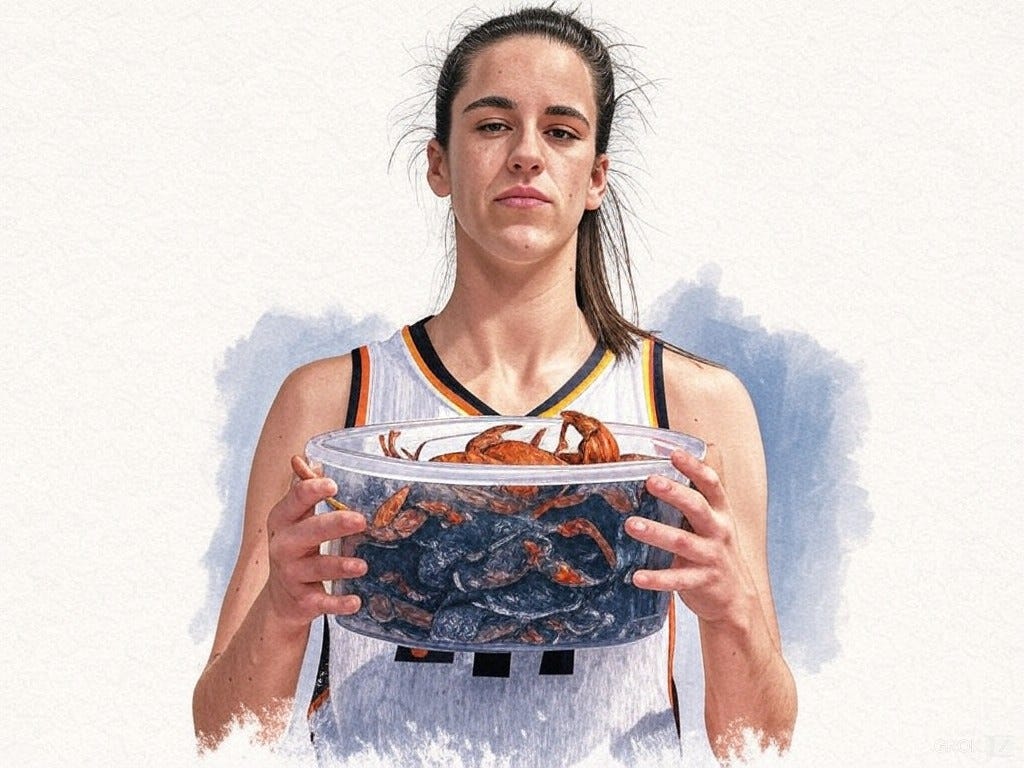The Caitlin Clark parable of collective demise
The WNBA's green-eyed monster
Caitlin Clark’s race makes for a trendy scapegoat.
This week, the WNBA lady baller was named “Athlete of the Year” by Time magazine. What is Time magazine, you may ask? No one’s quite sure anymore, but it does seem to resurface annually around this time with its quaint List of People to provide fodder for indolent online bickering. Then, like Brigadoon, the journalistic artifact recedes into the mist ‘til next December.
“I want to say I’ve earned every single thing, but as a white person, there is privilege. A lot of those players in the league that have been really good have been black players. This league has kind of been built on them,” Clark said in the interview with Time, feeling the tip of the spear in her back.
It’s a shame Tiger Woods never thought to acknowledge the race of the people who built his sport. Or the Williams sisters, for that matter. Yet both stand as lessons in the power of one charismatic athlete to invigorate millions of people around a once-niche competition.
Clark could have changed women’s basketball forever. I reckon she’s a good player (I don’t’ know, I don’t follow women’s basketball) but her record goes something like this: All-time lead-scorer across men’s and women’s in the NCAA; record holder for most three-pointers in the NCAA women’s division; led the NCAA in assists, one of only six women to surpass 1,000; top single-season scoring record; et cetera, etc.
More importantly, Clark had that thing, that compelling ebullience, which simply got people to pay attention. Her appearance did factor, but not because she’s Caucasian; one in five WNBA players are white. Gangly and awkward, Clark’s rectangularity and dull face are delightful to look at, like a young Julia Childs. But instead of rejoicing in their big break, just as Clark’s star shot up dragging the entire league along for the ride, a bunch of black lesbians snatched her back down to earth, ensuring their collective demise.
In June, a player named Chennedy Carter body-checked Clark on the court, leading to a flagrant foul upgrade after review. Player Diana Taurasi darkly forecasted on ESPN that “reality is coming” for Clark. In an interview with the Associated Press, player A’ja Wilson said, “a lot of people may say it's not about black and white, but to me, it is,” implying that Clark’s race is the reason for her celebrity.
(This all happened shortly after America was doused with the obnoxious antics of women’s soccer star Megan Rapinoe, reminding people why they never much cared for women’s sports in the first place, i.e. the repulsive and trifling personalities often involved).
Order 'Tucker' by Chadwick Moore, the New York Times bestselling biography of Tucker Carlson. Each book individually signed & personalized.
If you want to know what’s really going on here, ask a fisherman. Crab Bucket Mentality describes a phenomenon where individuals in a group—out of envy or a sense of insecurity—pull down others who are achieving success. The name comes from the behavior of crabs captured in a bucket, where if one crab tries to climb out, the others will pull it back down, ensuring that none escape.
This isn’t something that only happens in obscure organizations like the WNBA; there are entire nations in which reducing the self-confidence of those who strive beyond the collective is coded into the cultural DNA. Like, the U.K., for example. In American politics, it’s called equity—a defanged term for the greatest evil, the idea that by force or emotional coercion everyone should be smothered down to the same shitty level, in resources, ability, and aspirations.
Then again, it might just come down to the fact that basketball is racist. Larry Bird’s entrance into the NBA in 1979 was marked by similar animosity as that toward Clark. As one of the few prominent white players, Bird immediately faced accusations that his success was due to his skin color. Even Isiah Thomas and Dennis Rodman said so much, later apologizing.
While Bird’s famous rivalry with Magic Johnson may have been good for ratings—largely because of the racial component—the NBA didn’t need Bird the way the women need Clark. Yet the lady swagmasters are rejecting the much-needed assist.
“The more we can elevate black women, that’s going to be a beautiful thing,” Clark said following her glossy magazine photoshoot, where a new round of peer resentment is most certainly headed her way.
Good luck with that. Clark didn’t get the memo; race apologetics is out, and no amount of groveling will appease. No one wants a waffling, gutless sports hero.



Arthur Ashe was way before the Williams sisters. And he was a class act.
Crab bucket syndrome! Great point. I feel bad for Clark. I sad that such a talent is still so impressionable, that she can’t be proud of her own achievements.